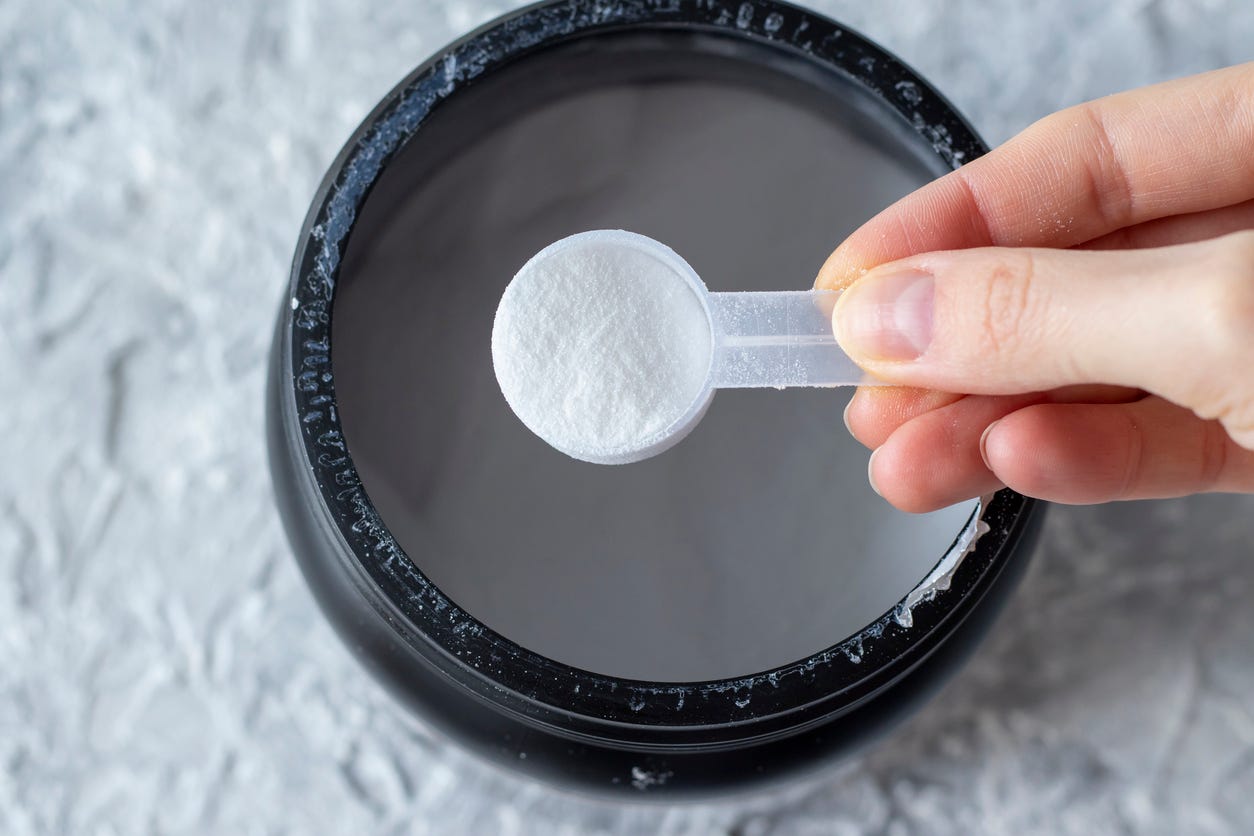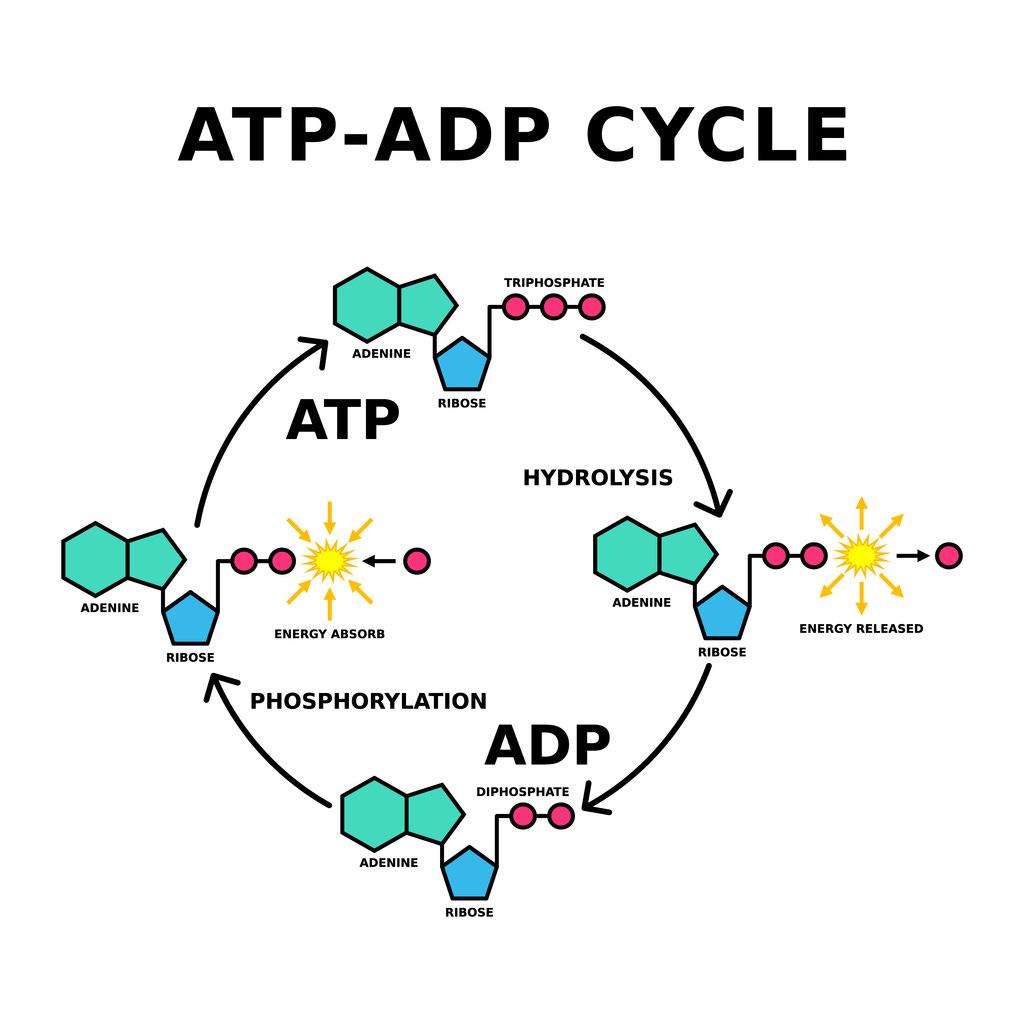I've been seeing a lot of posts about creatine because this effective strength-building supplement is being championed for its proposed cognitive benefits.
I thought it would be good to review what it is, and what the evidence shows.
Creatine – what is it and what does it do?
Creatine basically helps us generate more ATP (Figure 1). ATP is the energy currency of the cells - we break it down to generate energy for all the work that our cells do. For example, in muscle cells the breakdown of ATP is used to power muscle contractions.
So if creatine helps generate more ATP, does it help with any kind of exercise or activity we do?
Not necessarily - there's a lot of nuance to this, and to understand it we need to go back to the energy-generating systems of the body.
We basically have 3 ways of generating ATP*:
1. Oxidative System (Aerobic System)
This system provides sustained energy for prolonged, lower-intensity activities by using oxygen to produce ATP from carbohydrates, fats, and sometimes proteins (Remember that citric acid cycle > electron transport chain (ETC) diagram from school? Yes, that’s this one).
We use this system for most of our activities: we have a shit-ton of carbohydrate, fats around to oxidize, and for most of these activities, there’s usually enough oxygen around. The limitation of this system is that it’s quite slow, so not so good if you need a burst of explosive energy quickly.
2. Glycolytic System (Anaerobic Glycolysis)
This system produces ATP through the breakdown of glucose without the need for oxygen.
We tend to rely on this system most when we're doing moderately intensive activities like a 400-metre fast run, or activities where we have to retain a high level of effort (during which the oxygen supply to the muscle cells cannot be maintained sufficiently) of up to about two minutes.
1. Phosphagen System (ATP-PC System)
This system provides more immediate energy for short, explosive activities (sprints/power lifts, where you are lifting so much you can only do eg 1-3 reps) by utilizing stored ATP and phosphocreatine (PC) in the muscles. (Remember PC is going to donate a phosphate to make more ATP).
The limitation of this system is that there’s still a relatively tiny pool of ATP and PC available, which gets used up very, very quickly.
Creatine helps the third system because it helps increase the size of the phosphocreatine (PC) pool.
But does this mean that creatine is only useful for very brief explosive-type activities? No, because we have multiple trials showing that creatine in older adults helps increase the amount of weight people can lift over a high-rep training regime (eg 10-15 reps). So it’s not just power lifts it helps with.
However, if you're primarily doing moderate aerobic activity, the likelihood is you are generating more than enough ATP from the first two systems to support the type of activities you're doing.
Endurance athletes will also primarily be relying on the first system, BUT – if endurance athletes also do high intensity training, or intensive interval work as part of training for endurance events, then creatine can help support this type of explosive activity. Likewise, creatine probably helps with changes in pace, or a solid sprint finish. (But also note that one of the proposed side-effects of creatine supplementation is an increase body weight (it helps the muscle cells retain water), and this could be a disadvantage in eg long running events, because the athlete will need to use more power to move).
What about cognitive benefits?
Unfortunately it’s not clear, and there is no conclusive evidence despite what you may hear on podcasts.
I should acknowledge that stuff like cognition is hard to study: how do you measure it when it could mean lots of things? For example, “cognitive function” could mean attention, inhibitory control, memory and multiple executive functions.
Even if you manage to nail “cognitive function” down to just memory - even this is not straight forward to measure. Memory could be episodic, short-term, long-term working, visual…
So to capture this, what lots of investigators do is measure loads of things. Firstly, when you do that, you run the risk of generating false positives.
The other difficulty is that there are loads of ways of measuring each specific aspect of cognitive function (NIH Toolbox Fluid Cognition Battery (which itself consists of multiple tests); Flanker task, Stroop task, backward digit span, Raven's Advanced Progressive Matrices, repeated rugby passing skill test, reaction time procedure task)), but also very little consistency in what tests different research teams use. So pooling all the data together to see if creatine improves eg "episodic memory” is pretty difficult (see below for other challenges to pooling this kind of data).
EFSA (the European Food Safety Authority) looked at the data and tried to see if there was any consistency in reported improvements from all the trials, and there wasn’t. A good example is that while one non-randomised study found that creatine (5 g/day for 2 days after a 5-day loading phase with 20 g/day) improved working memory, two stronger studies (with comparable or greater creatine exposure and working/short-term memory tests) did not.
Salute the statisticians
Just a warning- two meta-analyses here and here were released in the last two years and got people excited. Quite remarkably, they both have the same pretty glaring statistical error: they both pooled the results of all the related cognitive tests from the same studies, and thereby counted each participant more than once. This artificially increases statistical power. This letter to the editor of the first meta-analysis shows how massive the problem is: “the number of unique participants originally included across 8 studies (n = 225) is nearly quadrupled in the main meta-analysis (n = 847 participants)”.
And kudos to the authors of the meta-analysis, because they responded, corrected their analysis, and found “that creatine monohydrate does not improve overall memory performance”.
EFSA studiously ignored the second meta-analysis for the same reason.
In conclusion, the evidence does not show creatine helps cognition and in October 2024 EFSA rejected an application for a potential European health claim that creatine improves cognitive function.
But………….creatine has a good safety profile, so why not?
The good thing about creatine is that it has been used for years and years, and lots of people taken it at very high doses, and we don’t seem to note any negative health outcomes. The most likely side-effect is gastrointestinal discomfort, but this is usually only at high doses. You don’t need to take more than about 3-5g per day. That’s good enough to help build strength, and if it makes your brain work better, hurray.
Also just to be completely transparent, I do heavy weight lifting, and high intensity interval training but I don’t take creatine mostly because I can’t be bothered with buying it/remembering to take it. But also there was one, yes ONE study that indicated creatine might be associated with hair loss or something and it has NEVER been replicated despite the ton of studies and trials done, and this is a great example of feelings trumping data because honestly I think this subconsciously affects my decision to not take it. I know, punch me, ha ha.
* Note that these systems work together, and overlap to some extent - the contribution to ATP production is based on duration and demand of activity, but for simplicity I describe them separately.
Disclaimer
As a dietitian, and not a medical doctor, I am not qualified to diagnose any health conditions.







Thanks so much for your review of the evidence! I'm one of the few who get rather severe GI side effects so I keep my supplementation at only 1/4t daily. I lift weights and do HIIT and would looove if I were getting some cognitive benefits. Not noticing any muscle or brain benefits. Based on your review, when I run out I think I won't bother buying more.
Funnily enough, since starting creatine all ive noticed is weight gain, and i feel noticeably more alert and feel i have more energy. No improvement in strength or amount of excercise i can endure